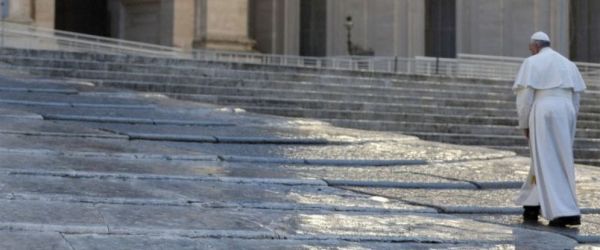The Gospel for today’s liturgy shows a few scribes and Pharisees amazed by Jesus’ attitude. They are scandalized because his disciples pick up food without first performing the traditional ritual ablutions. They think among themselves: “This way of doing things is contrary to the religious practice” (cf. Mk 7:2-5).
We too could ask ourselves: why do Jesus and his disciples disregard these traditions? After all, they are not bad things, but good ritual habits, simple cleansing before eating. Why is Jesus not concerned with this? Because for him it is important to bring faith back to its centre. We see it repeatedly in the Gospel: this bringing faith back to the centre. And to avoid a risk, which applies to those scribes as well as to us: to observe outward formalities, putting the heart and faith in the background. Many times we too “put makeup” on our soul. Outward formality and not the heart of faith: this is a risk. It is the risk of a religiosity of appearances : looking good on the outside, while neglecting to purify the heart. There is always the temptation to “deal with God” with some outward devotion, but Jesus does not settle for this worship. Jesus does not want outward appearances, he wants a faith that touches the heart.
In fact, immediately afterwards, he calls the people back to speak a great truth: “there is nothing outside a man which by going into him can defile him; but the things which come out of a man are what defile him” (v. 15). Rather, it is “from within, out of the heart” (v. 21) that evil things are born. These words are revolutionary, because in the mindset of the time, it was thought that certain foods or external contacts would make one impure. Jesus reverses the perspective: it is not what comes from the outside that is harmful, but rather, what is born from within.
Dear brothers and sisters, this also pertains to us. We often think that evil comes mainly from the outside: from other people’s conduct, from those who think badly of us, from society. How often we blame others, society, the world, for everything that happens to us! It is always the fault of “others”: it is the fault of people, of those who govern, of misfortune, and so on. It seems that problems always come from the outside. And we spend time assigning blame; but spending time blaming others is wasting time. We become angry, bitter and keep God away from our heart. Like those people in the Gospel, who complain, who are scandalized, who cause controversy and do not welcome Jesus. One cannot be truly religious while complaining: complaining poisons, it leads you to anger, to resentment and to sadness, that of the heart, which closes the door to God.
Let us ask the Lord today to free us from blaming others — like children: “No, it wasn’t me! It’s the other one, the other one…”. Let us ask in prayer for the grace not to waste time polluting the world with complaints, because this is not Christian. Jesus instead invites us to look at life and the world starting from our heart. If we look inside ourselves, we will find almost all that we despise outside. And if, with sincerity, we will ask God to purify our heart, then indeed we will be starting to make the world cleaner. Because there is an infallible way to defeat evil: by starting to conquer it within yourself. The first Fathers of the Church, the monks, when they were asked: “What is the path of holiness, how should I begin”? The first step, they used to say, was to blame oneself: blame yourself. Blaming ourselves. How many of us, during the day, in a moment of the day or a moment in the week, are able to blame ourselves within? “Yes, this one did this to me, the other one … that one, a barbarity…”. But me? Do I do the same thing, or do I do it this way.... It is wisdom: learning to blame yourself. Try to do it, it will do you good. It does me good, when I manage to do so, but it is good for us, it is good for everyone.
May the Virgin Mary, who changed history through the purity of her heart, help us to purify our own, by overcoming first and foremost the vice of blaming others and complaining about everything.
[Pope Francis, Angelus 29 August 2021]












